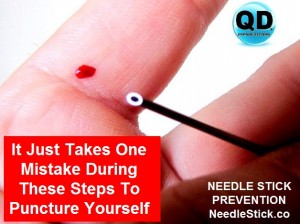 Preventing Needlestick Injuries in Health Care Settings WARNING!
Preventing Needlestick Injuries in Health Care Settings WARNING!
Health care workers who use or may be exposed to needles are at increased risk of needlestick injury. Such injuries can lead to serious or fatal infections with bloodborne pathogens such as hepatitis B virus, hepatitis C virus, or human immunodeficiency virus (HIV).
Employers of health care workers should implement the use of improved engineering controls to reduce needlestick injuries:
- Eliminate the use of needles where safe and effective alternatives are available.
- Implement the use of devices with safety features and evaluate their use to determine which are most effective and acceptable.
Needlestick injuries can best be reduced when the use of improved engineering controls is incorporated into a comprehensive program involving workers.
Employers should implement the following program elements:
Analyze needlestick and other sharps-related injuries in your workplace to identify hazards and injury trends.
Set priorities and strategies for prevention by examining local and national information about risk factors for needlestick injuries and successful intervention efforts.
Ensure that health care workers are properly trained in the safe use and disposal of needles.
Modify work practices that pose a needlestick injury hazard to make them safer.
Promote safety awareness in the work environment.
Establish procedures for and encourage the reporting and timely followup of all needlestick and other sharps-related injuries.
Evaluate the effectiveness of prevention efforts and provide feedback on performance.
Continued here:
Preventing Needlestick Injuries in Health Care Settings
______________________________________________
Tags: christopher green, Medical Device Safety, needle, Needlestick, qd syringe systems, safety syringe, syringe-hubs, syringe-news